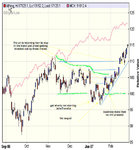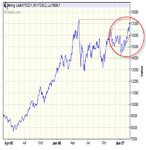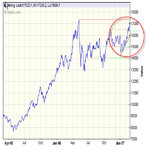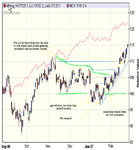Many moons ago I was sat next to a pro (and I hope you are keeping well) and i member eagerly saying "should we sell now ..should we move the stop up"..and he just sat there saying "we're just managing the trade"..I'm sure one or two here recognise those priceless words.
Crowding before you need to crowd is 'weak' ..it takes 'strength' for want of a better word to be willing to sit back until you see a real need to do more than that... I've come to decide that once you've cleared your hurdle on directional bias "managing the trade" is really what it's all about and where you need to show 'strength' when you know what your probs and expectancy are...give them the respect they deserve.
Crowding before you need to crowd is 'weak' ..it takes 'strength' for want of a better word to be willing to sit back until you see a real need to do more than that... I've come to decide that once you've cleared your hurdle on directional bias "managing the trade" is really what it's all about and where you need to show 'strength' when you know what your probs and expectancy are...give them the respect they deserve.






